 Leading Blog | Posts by Month |
 Leading Blog | Posts by Month |
08.31.25

LeadershipNow 140: August 2025 Compilation
See more on
Posted by Michael McKinney at 10:17 AM
08.28.25

Leading Thoughts for August 28, 2025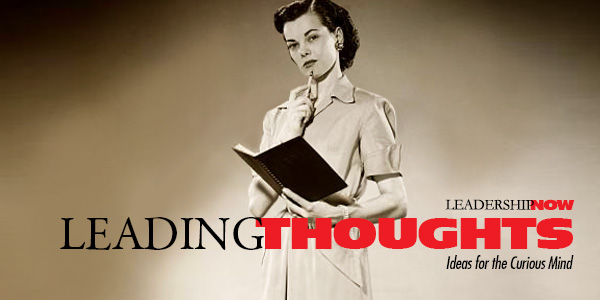
IDEAS shared have the power to expand perspectives, change thinking, and move lives. Here are two ideas for the curious mind to engage with: Luc de Brabandere on changing twice: “If you want to change, you have to change twice. You not only need to change the reality of your situation, you also need to change perception of this reality.” Source: The Forgotten Half of Change: Achieving Greater Creativity through Changes in Perception Nido Qubein on bureaucracy: “There is a tendency in any organization for it to become self-serving. The larger the organization grows and the older it is, the stronger this tendency expresses itself and becomes this kind of inertia, a growing gravitational field if you will, that pulls everything into its orbit. Whatever its stated goals or original mission may have been, the organization’s everyday purpose becomes more and more about the perpetuation of the organization itself. This is the essence of the term bureaucracy.” Look for these ideas every Thursday on the Leading Blog. Find more ideas on the LeadingThoughts index.
Posted by Michael McKinney at 10:27 AM
08.25.25

Extraordinary Transformation: An Inspiring Blueprint for Transformational Growth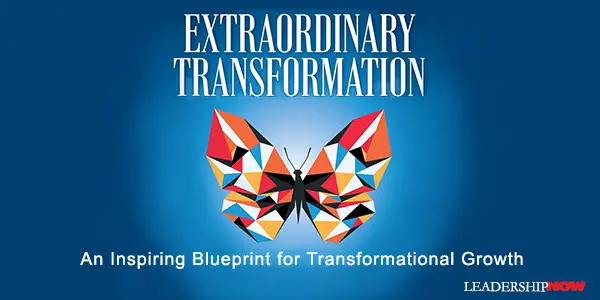
NIDO QUBEIN began serving as Highpoint University’s president in 2005. As he toured the school in January of that year, it was not a school that he would even send his own children to. He was about to change that. He has led the university through an extraordinary transformation during his two decades and counting in office, including: Undergraduate and graduate enrollment has increased from 1,500 in 2005 to a record 6,335 students last fall, with the addition of 12 academic schools. This has been supported with a jump in the number of faculty members from 108 to more than 500. The Campus itself has also grown significantly with the construction of 128 new or renovated buildings on Campus and a total investment of more than $3 billion. The Campus has expanded from 91 acres to over 550 acres. In addition, HPU’s rankings have jumped from #17 in 2005 to #1. The university has maintained the #1 Regional College in the South for 13 consecutive years in “America’s Best Colleges” by U.S. News & World Report and #1 Most Innovative for 10 consecutive years. Extraordinary Transformation: An Entrepreneurial Blueprint for Leaders Who Seek Transformational Growth in Any Organization not only explains how this transformation happened but also provides the principles that can be applied to your professional and personal life. Entrepreneurs take note. Qubein provides a guide to transformational change. Here are some of the insights found in this book:
If you want to know what it means to become extraordinary, then this book is for you. Read chapter 8, What is Your Promise? and raise your game. 
08.21.25

Leading Thoughts for August 21, 2025
IDEAS shared have the power to expand perspectives, change thinking, and move lives. Here are two ideas for the curious mind to engage with: Richard Daft on reflection: “Reflection is also a choice: that of thoughtful wisdom over instant reaction. The idea of reflection is to find deeper understanding of cause-and-effect relationships, because organizational problems often are more complex than they look. Things move so fast that often you may not know what you really think or feel about an issue. Reflection makes your mind proactive rather than reactive.” Source: The Executive and the Elephant: A Leader's Guide for Achieving Inner Excellence Antony Bell on humility: “Humility rests firmly on the foundation of self-awareness. Humility generates two qualities: a thirst for personal growth and a healthy dose of self-discipline. Requires a certain measure of humility to recognize what you don’t know and an equal measure to want to keep on learning. Humility recognizes that greatness requires work, and work requires self-discipline. Great leaders work hard, and, most of all, they work hard on themselves.” Source: Great Leadership: What It Is and What It Takes in a Complex World Look for these ideas every Thursday on the Leading Blog. Find more ideas on the LeadingThoughts index.
Posted by Michael McKinney at 03:23 PM
08.19.25

The Systems Leader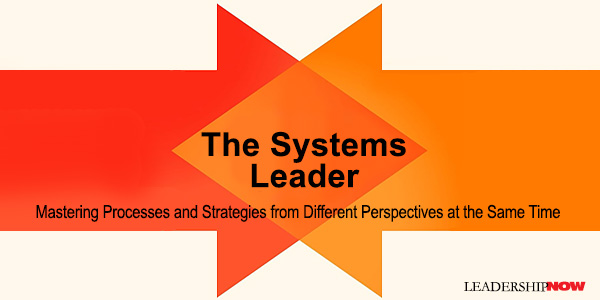
WE experience a tsunami of chaos in our environment, creating cross-pressures to achieve what appear to be contradictory goals at the same time. The solution is what Robert E. Siegel calls Systems Leadership. “Leaders face pressure to do opposing things at the same time, which can make them feel like no matter what they do or how well they do it, they are getting it all wrong.” The Systems Leader by Robert Siegel is based on systems thinking as made accessible in Peter Senge’s classic book The Fifth Discipline. In it, he “emphasized the interplay of actions and reactions between components of any kind of system, and the importance of studying those relationships holistically, not as isolated parts.” Systems Leadership incorporates strategies to reframe and learn how to master five key dimensions of cross-pressures that most leaders find themselves embroiled in and many fail to confront: Priorities: The need to succeed at both execution and innovation
Systems Leadership begins with embracing how much you don’t know at any given moment, and gives you a way to move forward with reasonable confidence but not delusional overconfidence. Siegel asserts that many leaders fail to deal with these cross-pressures because they engage in counterproductive behaviors that feel good in the moment. For example, replacing decorum with outrageousness, focusing on trivial goals, ignoring changes you don’t like, and indulging in self-righteousness. Regarding ignoring changes you don’t like, he says some leaders act like nothing has changed, “hoping that the traditional ways of the universe will somehow reassert themselves.” He adds, “Fully understanding the reasons for past successes can help you internalize whether your old ‘playbook’ is still useful for a current or future challenge.” Systems leadership is the “ability to master processes and strategies from different perspectives at the same time.” And to do it consistently in good times and bad. Here is a checklist of principles to guide your systems leadership: A Systems Leader’s Checklist Leader, know thyself. To be able to act intentionally rather than impulsively. “Leadership is the ability to constrain a response to a given stimulus.” Do the hard jobs yourself. You are not so important that you can’t get your hands dirty and model hard work. It’s moral authority. Be brave enough to say, I don’t know. No one has all the answers, nor are you in control of all that is happening. It’s okay. Listen to internal teammates you can trust. You can avoid many mistakes by listening to internal experts. Find trusted partners outside the company. You need trustworthy voices from outside the organization who can tell you what you need to hear and not what you want to hear. Hold two truths at once. “No matter how good things are now, prepare for a challenging future. And no matter how bad things are now, take heart that bad times don’t last forever.” Watch where you spend your time, because the people who report to you are watching. Make time for what matters most. Be mindful of the difference between skill and luck. There are times when your luck mattered more than your skills. “If nothing else, it will bring an awareness that the things you did during your lucky moments are not necessarily the playbook you should copy in the future.” Ask yourself if you’d rehire yourself today for your current job. Are you the best person for your role now? Changing times require new skills. 
Posted by Michael McKinney at 05:43 PM
08.14.25

Leading Thoughts for August 14, 2025
IDEAS shared have the power to expand perspectives, change thinking, and move lives. Here are two ideas for the curious mind to engage with: Timothy Gallwey on learning to change behavior: “By the word ‘learning’ I do not mean the collection of information, but the realization of something which actually changes one’s behavior—either external behavior, such as a tennis stroke, or internal behavior, such as a pattern of thought.” Source: The Inner Game of Tennis: The Classic Guide to the Mental Side of Peak Performance Developer Nicoll Hunt on the first step: “The first step of any project is to grossly underestimate its complexity and difficulty.” Source: Nicoll Hunt Look for these ideas every Thursday on the Leading Blog. Find more ideas on the LeadingThoughts index.
Posted by Michael McKinney at 12:42 PM
08.07.25

Leading Thoughts for August 7, 2025
IDEAS shared have the power to expand perspectives, change thinking, and move lives. Here are two ideas for the curious mind to engage with: Hermann Hesse on things we all can do: “To hold our tongues when everyone is gossiping, to smile without hostility at people and institutions, to compensate for the shortage of love in the world with more love in small, private matters; to be more faithful in our work, to show greater patience, to forgo the cheap revenge obtainable from mockery and criticism: all these are things we can do.” Source: If the War Goes on: Reflections on War and Politics
Henry Ford on the importance of giving value before you ask for value: “I quit my job on August 15, 1899, and went into the automobile business. ... The most surprising feature of business as it was conducted was the large attention given to finance and the small attention to service. That seemed to me to be reversing the natural process which is that the money should come as the result of work and not before the work. My idea was then and still is that if a man did his work well, the price he would get for that work—the profits and all financial matters—would care for themselves and that a business ought to start small and build itself up and out of its earnings.” Source: My Life and Work Look for these ideas every Thursday on the Leading Blog. Find more ideas on the LeadingThoughts index.
Posted by Michael McKinney at 10:49 AM
08.01.25

First Look: Leadership Books for August 2025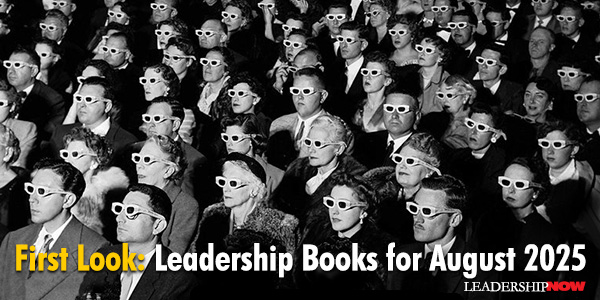
HERE'S A LOOK at some of the best leadership books to be released in August 2025 curated just for you. Be sure to check out the other great titles being offered this month.
The brutal truth: most startups and scale-ups don't fail because of bad products. They fail because they never figure out how to grow fast―and profitably. Some chase market share at all costs, burning cash on customers who won't pay enough to sustain the business. Others over-monetize too soon, pushing away the customers they need to reach scale. Still others obsess over customer loyalty, missing larger markets and monetization potential. And then there are those who assume a great product will sell itself, only to realize too late that pricing, packaging, positioning and value selling matter just as much. The true winners take a different approach. They adopt a Profitable Growth Mindset, refusing to choose between market expansion and monetization―instead, they dominate both. Instead of relying on instinct or momentum.
What if you could summon genuine confidence anytime you need it? Being happier, building better relationships, overcoming fear: the missing link between you and everything you want to achieve is self-confidence. The problem? Confidence is hard to build, and even when we do, it often feels temporary and forced. After years of research and working with over 250,000 individuals, Juan Bendaña uncovered the four myths about confidence that actually cause and reinforce self-doubt. Confidence is not linked to genetics, extraversion, insecurities, or competence. To combat these myths, Juan Bendaña developed the Confidence Cycle, a repeatable flywheel that will help you gain and sustain confidence in every aspect of life through three key decisions: Decision #1: Micro-Energy, Decision #2: Micro-Courage, Decision #3: Micro-Action
Great leaders don’t just see the path ahead—they see themselves clearly first; mastering self-awareness is the difference between thriving at the top and blindly leading toward failure. Great leaders aren’t just skilled strategists—they’re deeply self-aware. In Aware, Les Csorba, reveals how identifying blind spots and having the courage to address them can determine the success or failure of a leader and their organization. Drawing from decades of experience as a Partner with Heidrick & Struggles, the worldwide recruiting and leadership consulting firm advising top executives and Fortune 500 corporate boards—and his time serving as Special Assistant to the President in the White House —Les shares how self-awareness, paired with bold action, separates exceptional leaders from those who fall short.
Be yourself. Be fully present. Be in the moment. This is a message we hear constantly. While this may be beneficial some of the time, the biggest obstacle to making wiser decisions that actually drive lasting success is ourselves. Being fully immersed in our own limited point of view biases our decisions toward defending our previous actions and maintaining our self-image. We need to exit our me-here-and-now self and get an outside perspective that sees us and the situation we are in objectively. We need a coach. This book shows us how to become our own coach by using a mental technique called psychological distancing.
Tap into your hidden intelligence and transform your life. How are some people so much smarter than the rest of us? Where do visionary creatives and savvy decision-makers like Vincent van Gogh, Steve Jobs, Abraham Lincoln, Maya Angelou, Nikola Tesla, Marie Curie, Albert Einstein, Wayne Gretzky, Warren Buffett, and William Shakespeare get their extraordinary mental abilities? In 2021, researchers at Ohio State’s Project Narrative, renowned for collaborations with NASA, Hollywood, and Silicon Valley, announced they had the answer. They named it Primal Intelligence. And they published scientific proof that Primal Intelligence was impossible for computers—but could be strengthened in humans. Intrigued, U.S. Army Special Operations developed Primal training for its most classified units. The Army then authorized trials on civilian entrepreneurs, doctors, engineers, managers, salesforces, coaches, teachers, investors, and NFL players. Their leadership and innovation improved significantly. They coped better with change and uncertainty. They experienced less anger and anxiety. Finally, the Army provided Primal training to college and K-12 classrooms. It produced substantial effects in students as young as eight.
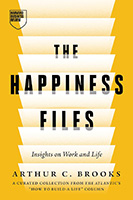 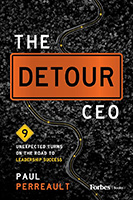 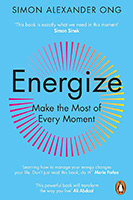 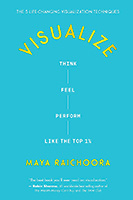
“You can't think well without writing well, and you can't write well without reading well. And I mean that last "well" in both senses. You have to be good at reading, and read good things.” — Paul Graham, Y Combinator co-founder
|
BUILD YOUR KNOWLEDGE


How to Do Your Start-Up Right STRAIGHT TALK FOR START-UPS 
Grow Your Leadership Skills NEW AND UPCOMING LEADERSHIP BOOKS 
Leadership Minute BITE-SIZE CONCEPTS YOU CAN CHEW ON 
Classic Leadership Books BOOKS TO READ BEFORE YOU LEAD |
|